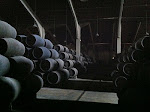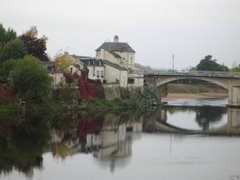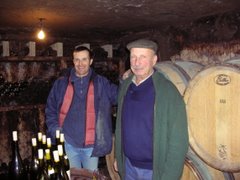Matt Kramer's Making Sense of Burgundy - Some Quotes
I had a birthday in November and a friend gave me a fantastic gift - Matt Kramer's "Making Sense of Burgundy." This book was published in 1990 and it continues to be on most shortlists of great wine books. I actually have read almost no wine books, so my entire list is a short list. But I must say, this book is wonderful. It offers plenty of fun for the obsessive among us, listing every owner of every Grand and 1er Cru vineyard in the Côte d'Or, as of the late '80s, anyway. There is apparently no other published source of this information. Kramer also describes in matter-of-fact prose the characteristics of these vineyards and the wines they are capable of producing. There are discussions of value in Burgundy and the relative achievements of individual producers (and it's fascinating to compare his predictions about rising stars with the producers today who are making waves).
The section of the book that I find myself thinking abut the most, so far, is the chapter called "The Notion of Terroir." Kramer talks about all sorts of things here - you'll read about acupuncture, abstract expressionist painting, and the feudal ages in Europe, among other things. In this chapter are several passages that have really captured my attention and I find myself reading them over and over. Kramer shares his thoughts on terroir, and it's as compelling as anything I've read on that rather wide subject.
From page 39-40:
"Although it is derived from soil or land (terre), terroir is not just an investigation of soil and subsoil. It is everything that contributes to the distinction of a vineyard plot. As such, it also embraces 'microclimate': precipitation, air and water drainage, elevation, sunlight, and temperature. But terroir holds yet another dimension: It sanctions what cannot be measured, yet still located and savored. Terroir prospects for differences. In this it is at odds with science, which demand proof by replication rather than in shining uniqueness."
Hard to imagine a simpler and more effective notion of terroir, no?
And how about this, from page 42-43:
"The supreme concern of Burgundy is - or should be - making terroir manifest. In outline, this is easily accomplished: small berried clones; low yields, selective sorting of the grapes; and, trickiest of all, fermenting and cellaring the wine in such a way as to allow the terroir to come through with no distracting stylistic flourishes. This is where terroir comes smack up against ego, the modern demand for self-expression at any cost, which, too often, has come at the expense of terroir."
And this too, from page 45:
"The ideal is to amplify terroir without distorting it. Terroir should be transmitted as free as possible of extraneous elements of style or taste. Ideally, one should not be able to find the hand of the wine-maker. That said, it must be acknowledged that some signature always can be detected, although it can be very faint indeed when you reach the level of Robert Chevillon in Nuits-Saint-Georges; Bernard Serveau in Morey-Saint-Denis; or the marquis d'Angerville or Gérard Potel, both in Volnay, to name a few. The self-effacement of these producers in their wines is very nearly Zen-like: their signature is an absence of signature."
Fascinating ideas, I would say. So many things to think about in there. I wonder about some of the ideas in the final quote. Is it physically possible for there to be no signature? Wine is made, after all, and this handling of grapes leaves some trace behind. Or does it? And who is this Bernard Serveau, and I feel like a schmuck for never having tasted one of his wines. What do you think about when you read the above quotes? Were you as blown away as I am when you first read Making Sense of Burgundy?
I think I should read some more about wine. So, what are some of your favorite wine books? Not novels, I mean. Reference books, books that offer this sort of illumination about a place or certain wines.







9 comments:
Agree, Kramer's essays on terroir are unmatched and make it worth the effort to track the book down (no longer in print).
Kermit Lynch's "Adventures on the Wine Route" is a must read. The chapters on Burgundy, Bandol, and Beaujolais, while perhaps a bit of a caricature, are wonderful. One of the best food/wine combos I have ever experienced came as a direct result of the book: Tempier Rose and bouillabaisse at Chez FonFon in Marseilles.
The topographical vineyard maps in the burgundy section of "World Atlas of Wine" are also worth considering.
I was still working for Neal when Kramer's book came out. it was quite controversial at the time, as he was seen as a sort of anti-Parker (kinda like Alice Feiring is now). Until Kramer's book was released, Parker's Burgundy book was the dominant treatise on the subject...and most of us in and around the business just hated his almost absolute rejection of terroir.
Serveau's style was very similar to Bernard Amiot in Chambolle. Pretty, pure, feminine, unembellished. I have read in other publications that he's currently in failing health and the domaine has gone downhill.
The first quote took me back to when I was in college learning about various "computational" (for lack of remembering the correct word) theories about consciousness. There were these philosophers in the '50s and '60s who thought that if we progressed far enough in science, everything about the brain and consciousness could be explained in terms of computation... theoretically at least. In spite of the arguments, I remained firmly convinced that consciousness was not reducible to science, namely that there would always be something - the terroir of the individual - that defied science to explain.
I have a few Burgundy books in my bookshelf and they are all books I use as reference literature. To read about a producer, a vineyard, a village or something else of interest.
There is one book though that stands out and it's a thin book by Jacky Rigaux in which he has interviewed the "Great Master of Burgundy", Henri Jayer.
The book is: "A tribute to the great wines of Burgundy - Henri Jayer, winemaker from Vosne-Romanée - Jacky Rigaux"
The book is intimate and personal and it describes the philosophy and thoughts that are the basis for Henri's strive for perfection.
A perfection based on love and respect for the vine and land, together with a way of work that should be as natural as possible.
Highly recommended.
//P
Reading between the vines, by Terry Theise.
You want to know about wine? Make some yourself. Most wine writing delivers nice proze but I'm not sure if it ever hits the 'sweetspot'. So instead of reading get into the vinyards. If that is not a possibility start a garden. In the end it is growing good grapes that is maybe most trickiest. And to me d'Angerville has got quite a signature, maybe small when compared with modern producers but among his sort you can pick it out.
Coates book on Burgundy is nice to pick up now and then. Read the preface, pretty good without mentioning terroir to often.....
Man, I gotta tell you, I would much rather have a Hello Kitty Mug than some book.
clive coates on burgundy, romanee conti by olney, dyquem by olney, parker bio, passion on the vine by esposito, etc.
I find Matt Kramer's notions of terroir compelling as well. One more book to add, The New France. A great update on each wine region in France. A must-read.
Post a Comment